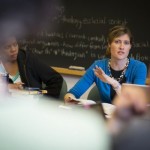Teaching Statement for Seminary Education
Teaching should increase a student’s ability to continue learning. I find this to be especially true in seminary education related to social ethics and ministerial formation. I believe teaching ethical reflection is a critical skill which promotes personal moral formation balanced by obligations to the community on levels of local commitment with awareness of global impact. I use a praxis model of teaching that encourages students to engage theological and moral issues through reflection on personal experience, understandings of religious traditions, and investigation of current social and political justice movements.
 As students learn primarily outside the classroom, I ask them to integrate current social trends through use of multimedia aides and personal ministry reflection. I encourage students to contribute media examples of music, sitcoms/movies, YouTube clips, and news articles that are related to their specific contexts and our weekly topics. These examples animate class participation and allow the students democratic participation in emergent curriculum designs and application of class themes. I also pair current events coverage and sociological data (such as polling) with ‘traditional’ texts to highlight historical continuities and discontinuities facing religious communities. Such knowledge can also be gained through reflection on ministry settings. In light of gaps between theo-ethical theory and practice, students recognize the various nuances of resource allocation or implicit bias along with the glaring inequalities brought about by racism, sexism, and classism. These experiences teach in a different way than reading a book, often making real the intersection of oppressions through personal behavior as well as systemic control. The two can be complimentary ways of learning when cultivated by an engaged action/reflection model in the classroom and through assignments.
As students learn primarily outside the classroom, I ask them to integrate current social trends through use of multimedia aides and personal ministry reflection. I encourage students to contribute media examples of music, sitcoms/movies, YouTube clips, and news articles that are related to their specific contexts and our weekly topics. These examples animate class participation and allow the students democratic participation in emergent curriculum designs and application of class themes. I also pair current events coverage and sociological data (such as polling) with ‘traditional’ texts to highlight historical continuities and discontinuities facing religious communities. Such knowledge can also be gained through reflection on ministry settings. In light of gaps between theo-ethical theory and practice, students recognize the various nuances of resource allocation or implicit bias along with the glaring inequalities brought about by racism, sexism, and classism. These experiences teach in a different way than reading a book, often making real the intersection of oppressions through personal behavior as well as systemic control. The two can be complimentary ways of learning when cultivated by an engaged action/reflection model in the classroom and through assignments.
I place the purpose of learning at the center of the classroom experience as opposed to myself as educator. As such, I hold high standards for participation within the class and offer a variety of avenues – such as interviewing classmates, small groups, reflection exercises, chat rooms, group projects – that allow those who are vocal and those who are not to participate in ways that are comfortable. In addition to participatory opportunities, I stress the development of writing skills to express one’s critical thinking as a skill that will carry over in other coursework and one’s future professional life. Yet, I offer latitude in creatively completing writing assignments appropriate for different ministry settings including models of academic publishing, sermon writing, blog posts, or religious education curriculum. Attendance is also a high priority as I understand the classroom to be a place where theoretical course information comes together with real life experience in the context of community.
Practicing one’s ideas, expressing one’s self clearly, and situating one’s actions within a community of accountability are all part of what I have learned create a fruitful learning experience and lead to perspective transformation. This is part of the process of moral formation and effective ministry. I strive to embody these ideals in the classroom and educate implicitly through participation as a member in other aspects of the institution and my own community.
Technology is most often referred to as a “tool” for teaching. However, technology, especially digital media is often a meaning maker which transforms pedagogical style, power relationships, and the overall learning experience. I currently teach a digital ethics course that seeks to develop an ethic of digital literacy by addressing the impact of algorithms, data and social surveillance, impression management, and ecological issues, as students create a Domain of One’s Own.
